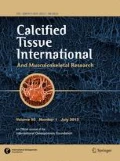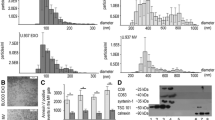Abstract.
Since both osteoclasts and macrophages belong to the mononuclear phagocytic system it is conceivable that bisphosphonates not only affect bone metabolism but also inflammatory responses. The migration of mononuclear cells into perivascular tissue is a central event in inflammatory reactions. We studied the effects of the aminobisphosphonate alendronate on the transendothelial migration of human peripheral blood mononuclear cells in an in vitro model. Alendronate (at a concentration of 100 μM) significantly increased the percentage of peripheral blood mononuclear cells that migrated through endothelial cell monolayers. Similar results were obtained with another aminobisphosphonate, viz, pamidronate. An overnight treatment of the endothelial cell monolayers with alendronate did not alter the rate of peripheral blood mononuclear cells that subsequently migrated. The overnight cultivation of the peripheral blood mononuclear cells in the presence of alendronate resulted in an increased surface expression of CD54 (intercellular adhesion molecule-1, ICAM-1) in both CD14+ and CD3+ cells; in CD14+ cells also the expression of CD49d (α4 subunit of late activation antigen-4, VLA-4) increased after alendronate treatment. Alendronate treatment of peripheral blood mononuclear cells also resulted in an increased production of interleukin-1β (IL-1β), tumor necrosis factor-α (TNF-α), and interferon-γ (IFN-γ). We conclude that alendronate has a distinct effect on the transendothelial migration of human peripheral blood mononuclear cells in vitro. Alendronate may either directly or indirectly, e.g., by augmenting the production of proinflammatory cytokines, influence the expression of certain adhesion molecules and thereby facilitate transendothelial migration. These effects could be related to the transient leukopenia reported following intravenous administration of relatively high doses of aminobisphosphonates for the treatment of hypercalcemia of malignancy.
Similar content being viewed by others
Author information
Authors and Affiliations
Additional information
Received: 11 September 1997 / Accepted: 20 February 1998
Rights and permissions
About this article
Cite this article
Pietschmann, P., Stohlawetz, P., Brosch, S. et al. The Effect of Alendronate on Cytokine Production, Adhesion Molecule Expression, and Transendothelial Migration of Human Peripheral Blood Mononuclear Cells. Calcif Tissue Int 63, 325–330 (1998). https://doi.org/10.1007/s002239900535
Issue Date:
DOI: https://doi.org/10.1007/s002239900535




